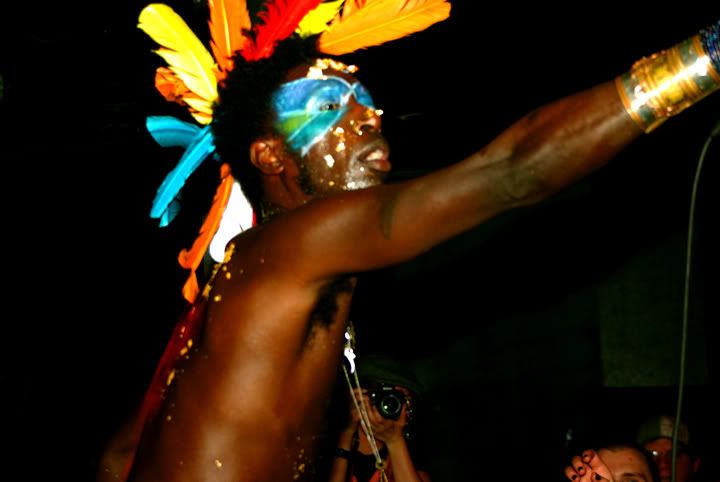
Saul electrifies while sending out positive messages
Normally when the crowd is screaming, “I want my money back” as Saul Williams’ audience did on Friday night, it would be a bad thing. But during this engaging and intimate Martyrs set, the audience was singing back lyrics to Saul’s popular song. If you asked anyone in the room after the show, $16 was a bargain even just to see the opening band, Dragons of Zynth, let alone Mr. Williams.
Saul’s set was energy-infused, as he sang, rapped, danced, and performed spoken word. Despite the eccentric feathered outfits and confetti, the show didn’t come across as filled with theatrical antics, only further demonstrating his talents as an artist. A dead microphone didn’t even stop Saul as he flung it to the floor and continued to spew out his passionate and evocative lyrics mixed with names of avant-garde poets/activists. As the night came to a close, a spirited round of happy birthday was sung for his endearing merch girl.
A remarkable part of the show was the attentive crowd, singing and cavorting to every song, instead of playing with cell phones as you see at most concerts today. There were even fans, who were not lucky enough to score tickets, vying for a glimpse through the venue’s large windows from outside.
A feather clad Saul played a long set nearing almost two hours, and covered most of the tunes from his self-titled, Internet-released album, The Inevitable Rise and Liberation of Niggy Tardust. Crowd favorites included the opening song, “Grippo” as well as “Tr(n)igger,” “Sunday Bloody Sunday,” “Niggy Tardust,” and “List of Demands (Reparations).” “Black Stacey” was another highlight and was dedicated to “anyone that’s ever been in an awkward place.” He even thanked his fans and Illinois for voting Senator Obama into office, proclaiming him our future president.
The audience departed the set in awed silence and exhaustion. The most electrifying item that Saul brought to the table was a positive and resonating message, as he encouraged the crowd to define themselves as multifaceted and alive, rather than with prescribed identities of race and sexuality. “I think we all know race is just a social construct,” he said. –Laura Gray